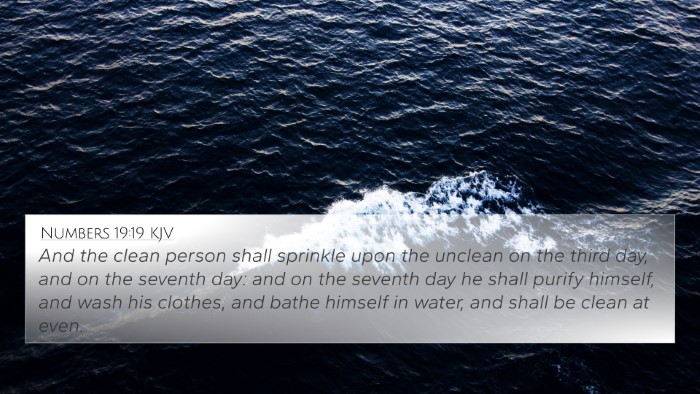Understanding Leviticus 17:16
Leviticus 17:16 states: "But if he does not wash them or bathe his body, he will bear the iniquity of his guilt." This verse emphasizes the significance of ritual purity and adherence to divine commandments within the Israelite community.
Summary of Insights from Public Domain Commentaries
- Matthew Henry: This verse reinforces God's expectation for His people to maintain holiness. Henry highlights that spiritual cleanliness is essential, and neglecting rituals may cause one to carry the weight of sin upon themselves.
- Albert Barnes: Barnes notes that ritual washing is associated with the cleansing requirements for individuals who partake in sacred acts, such as consuming sacrificial offerings. He interprets this act as a necessary step in acknowledging God's holiness and one's sinfulness.
- Adam Clarke: Clarke emphasizes that the bodily washing symbolizes a deeper spiritual implication. The act calls for introspection and repentance, showcasing the need for believers to cleanse themselves from spiritual impurities before approaching God.
Thematic Connections and Cross-References
This verse serves as a powerful reminder of the connections between physical acts of worship and the inward spiritual condition of believers. The following cross-references offer additional insights and reinforce the importance of ritual purity:
- Exodus 30:20: The requirement for priests to wash in the water before entering the tent of meeting.
- Isaiah 1:16-17: The call to cleanse oneself and to seek justice, which resonates with the need for inner purity.
- Matthew 23:26: Jesus instructs the Pharisees to cleanse the inside of the cup, highlighting a theme of inner purity over mere external actions.
- Hebrews 10:22: Encourages believers to draw near with a true heart in full assurance of faith, having their hearts sprinkled clean.
- 1 Peter 1:22: Calls for believers to purify their souls by obedience to the truth, establishing a connection between obedience and spiritual cleansing.
- Psalms 51:7: David's cry to be cleansed with hyssop illustrates the longing for spiritual renewal and forgiveness.
- James 4:8: A directive to draw near to God by cleansing hands and purifying hearts, linking the physical and spiritual purification processes.
Reflections on Leviticus 17:16
As we draw connections between different scripture passages, the comprehensive study of Leviticus 17:16 reveals themes of holiness, the necessity of ritual, and the importance of spiritual readiness. Understanding each verse contextually provides a richer interpretation that aligns with the overarching narrative of redemption found throughout the Bible.
Conclusion
In summary, Leviticus 17:16 serves as a reminder of the significance of both physical and spiritual purity in our relationship with God. Through comparative Bible verse analysis and cross-referencing Biblical texts, we can appreciate how various passages interlink to convey the overarching themes of holiness, repentance, and God's desire for His people to approach Him with clean hands and pure hearts.
Bible Study Resources
To further explore cross-references and thematic connections, consider utilizing the following:
- Tools for Bible cross-referencing
- Bible concordance
- Bible cross-reference guide
- Cross-reference Bible study materials
- Comprehensive Bible cross-reference systems












